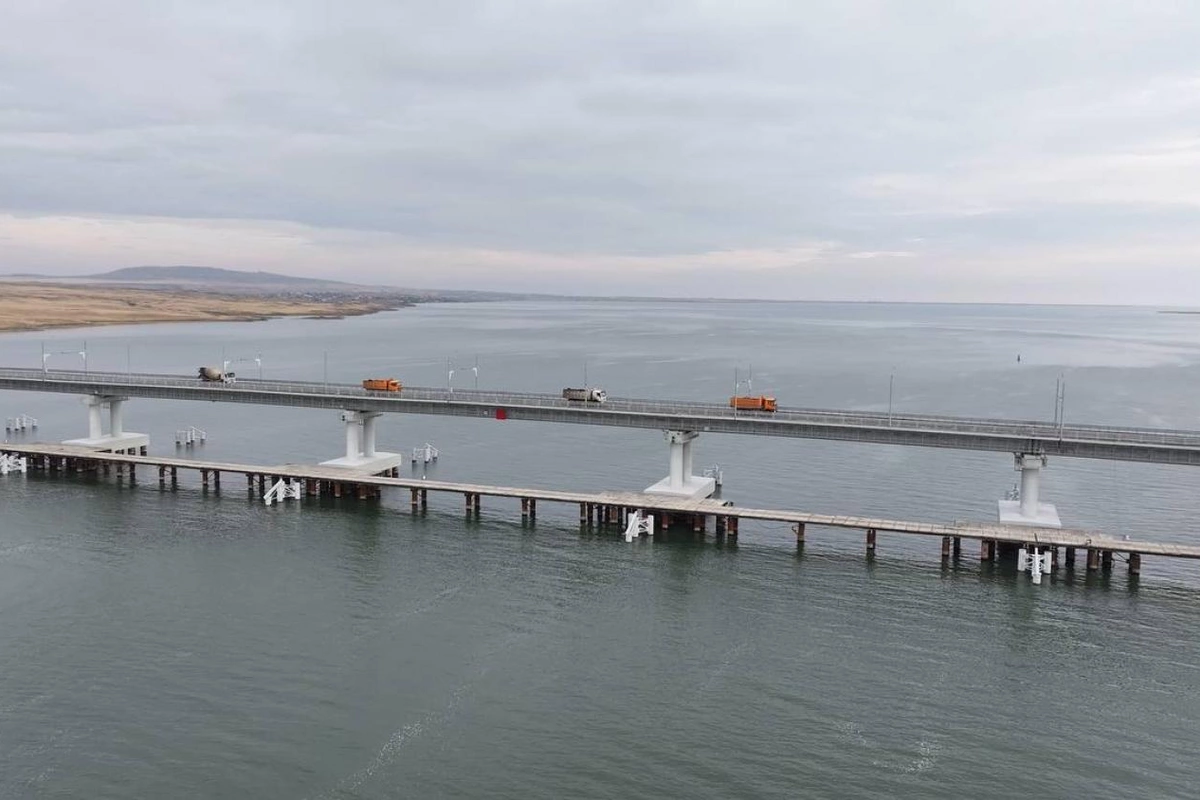
A bridge from east to west, newly opened on Bukhtyrma Dam, Kazakhstan (Kazakhstan Prime Ministry via Anadolu/Getty Images)
Central Asia, once on the periphery of global diplomatic relations, has risen to the forefront of Western agendas due to Russia's war in Ukraine. This heightened focus is expected to continue and intensify in the coming year.
Central Asian states, particularly Kazakhstan, are rich in energy resources and critical minerals, essential for producing batteries and renewable energy technologies. And with a new US president taking office this month, Europe is likely to diversify its international partnerships. During Donald Trump’s first term, tariffs on European steel and aluminium, the withdrawal from the Paris Climate Agreement as well as the Iran nuclear deal left European allies feeling sidelined. While the United States remains a key ally, the EU is expected to explore deeper ties elsewhere, with Central Asia gaining interest, The Caspian Post reports citing foreign media.Moreover, as discussions continue about potential negotiations to end the war in Ukraine, Astana, Kazakhstan’s capital, could serve as host for such talks or at least an initial meeting between Trump and Russian President Vladimir Putin. Kazakhstan maintains good relations with both countries, as well as Ukraine, and has previously hosted negotiations between Armenia and Azerbaijan, making it a neutral platform for discussions.
It’s unclear whether Brussels will lift its sanctions on Moscow. In the meantime, Central Asia, bordering Russia, will play a key role in preventing sanctions evasion and facilitating trade routes from Asia to Europe that bypass Russian territory.
Economic and trade relations between Europe and Central Asia have expanded in recent years. The EU is Kazakhstan’s largest trading partner, accounting for about 30% of the country’s foreign trade. In the first ten months of 2024, trade turnover increased by 23%, amounting to $41.2 billion.
Kazakhstan, the most economically developed country in Central Asia and newly recognised as a “middle power”, is a key partner for Europe in energy security and critical minerals. Elements such as tungsten and lithium are required for Europe’s technological and green transition, as they are used for electric vehicle batteries and renewable energy technologies. In June, Kazakhstan announced plans to declassify data on rare-earth and rare-metal deposits. As it produces 19 out of the 34 raw materials classified as “critical” by the EU, Kazakhstan can be a strategic partner for the West in this area, helping Europe to reduce reliance on single-source suppliers, such as China.
Furthermore, with estimated oil reserves of 78 billion tonnes and an average oil production of 1.8 million barrels per day, Kazakhstan is a source of fossil fuels in the wider Eurasian region. In 2024, Kazakhstan exported around 88 million tonnes of oil, with more than 70% sent to EU nations.
Amid ongoing geopolitical tensions, increasing connectivity and diversifying trade routes is a priority for Europe. Central Asia’s location makes it essential for Europe to strengthen its connectivity with Asia.
A promising development is the Trans-Caspian International Transport Route (TITR). It runs from China to Europe through Kazakhstan, the Caspian Sea, Azerbaijan, Georgia, and Türkiye, offering a viable alternative to traditional trade routes dominated by Russia. Kazakhstan has heavily invested in developing this corridor, looking to become a transit hub between East and West. The volume of cargo transported through the TITR rose by 63% in the first 11 months of 2024, reaching 4.1 million tonnes.
The EU is aware of the benefits, committing €10 billion to enhance interconnectivity in Central Asia. Additionally, the European Investment Bank and the European Bank for Reconstruction and Development signed agreements totalling €1.47 billion with Kazakhstan, Kyrgyzstan, and Uzbekistan. Europe can gain better access to Asian markets if it continues to invest in this emerging route, while also reducing over-reliance on any single trade route.
The West has an opportunity to expand its influence in a region traditionally dominated by Russia and China. Greater Western engagement could offer Central Asia alternatives to overreliance on Moscow or Beijing. For example, after Kazakhstan’s recent referendum on building its first nuclear power plant, France, with its nuclear expertise, could contribute to Kazakhstan’s energy development - a sector also attracting interest from Russia and China.
Germany has taken the initiative to strengthen its relations with Kazakhstan by offering cooperation in sectors such as green hydrogen and rare earth materials.
A major step in advancing strategic engagement occurred at the inaugural EU-Central Asia leaders’ summit in April 2024 in Uzbekistan, where Central Asian leaders and senior EU officials formalised the “C5+EU” framework. The summit focused on enhancing energy security, expanding trade, and strengthening transport connectivity via TITR.
Germany has also established a “C5+1” dialogue with Central Asia, hosting the second meeting between Central Asian leaders and Chancellor Olaf Scholz last year in Astana. They agreed on economic cooperation in energy, infrastructure, and environmental sustainability, with plans for renewable energy projects, glacier protection, and water management.
The “C5+1” initiative offers a platform to promote regional stability and diversify Central Asia’s economic ties. Both sides would benefit from greater Western engagement with this historically overlooked region, which now holds strategic value at the crossroads of East and West.
Share on social media
